| |||||
| Decades: | |||||
|---|---|---|---|---|---|
| See also: | Other events of 1952 List of years in Egypt | ||||
Events in the year 1952 in Egypt .
| |||||
| Decades: | |||||
|---|---|---|---|---|---|
| See also: | Other events of 1952 List of years in Egypt | ||||
Events in the year 1952 in Egypt .

Farouk I was the tenth ruler of Egypt from the Muhammad Ali dynasty and the penultimate King of Egypt and the Sudan, succeeding his father, Fuad I, in 1936.

Fuad II, or alternatively Ahmed Fuad II, is a member of the Egyptian Muhammad Ali dynasty. He formally reigned as the last King of Egypt and the Sudan from July 1952 to June 1953, when he was deposed.
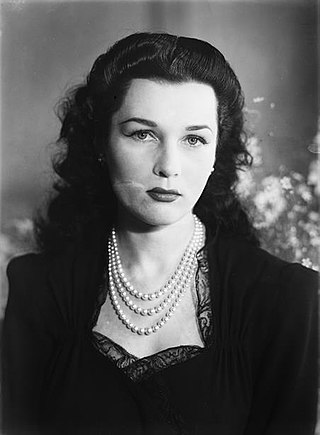
Fawzia of Egypt, also known as Fawzia Pahlavi or Fawzia Chirine, was an Egyptian princess who became Queen of Iran as the first wife of Mohammad Reza Pahlavi, Shah of Iran.
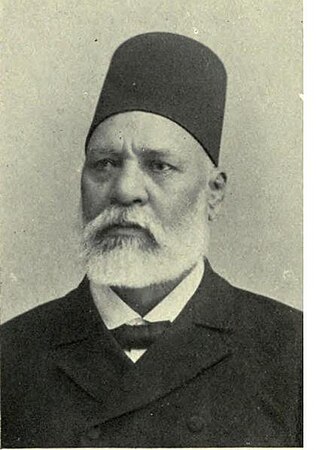
Ahmed ʻUrabi, also known as Ahmed Ourabi or Orabi Pasha, was an officer of the Egyptian army. The first political and military leader in Egypt to rise from the fellahin, ʻUrabi participated in an 1879 mutiny that developed into the ʻUrabi revolt against the administration of Khedive Tewfik, which was under the influence of an Anglo-French consortium. He was promoted to Tewfik's cabinet and began reforms of Egypt's military and civil administrations, but the demonstrations in Alexandria of 1882 prompted a British bombardment and invasion which led to the capture of ʻUrabi and his allies and the imposition of British control in Egypt. ʻUrabi and his allies were sentenced by Tewfik into exile far away in Ceylon, as a form of punishment.
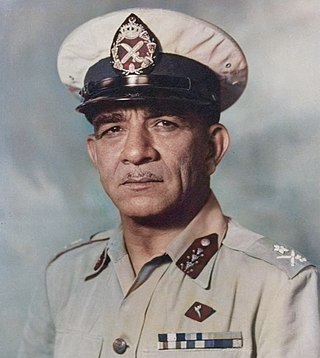
Mohamed Bey Naguib Youssef Qutb El-Qashlan, also known as Mohamed Naguib, was an Egyptian revolutionary, and, along with Gamal Abdel Nasser, one of the two principal leaders of the Egyptian Revolution of 1952 that toppled the monarchy of Egypt and Sudan, leading to the establishment of the Republic of Egypt, and the independence of Sudan.
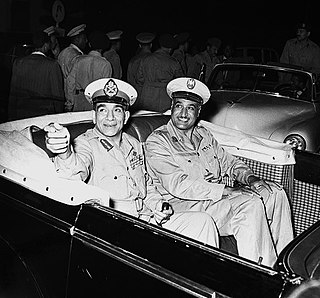
The Egyptian Revolution of 1952, also known as the 1952 Coup d'état and 23 July Revolution, was a period of profound political, economic, and societal change in Egypt. On 23 July 1952 the revolution began with the toppling of King Farouk in a coup d'état by the Free Officers Movement. This group of army officers was led by Mohamed Naguib and Gamal Abdel Nasser. The Revolution ushered in a wave of revolutionary politics in the Arab World, and contributed to the escalation of decolonisation, and the development of Third World solidarity during the Cold War.
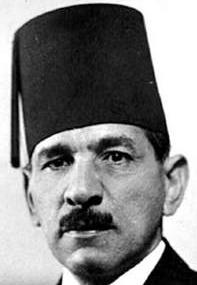
Aly Maher Pasha was an Egyptian political figure.
This is a list of ministers heading the Ministry of Foreign Affairs of Egypt.

The Kingdom of Egypt was the legal form of the Egyptian state during the latter period of the Muhammad Ali dynasty's reign, from the United Kingdom's recognition of Egyptian independence in 1922 until the abolition of the monarchy of Egypt and Sudan in 1953 following the Egyptian Revolution of 1952. Until the Anglo-Egyptian treaty of 1936, the Kingdom was only nominally independent, as the United Kingdom retained control of foreign relations, communications, the military, and Sudan. Officially, Sudan was governed as a condominium of the two states, however, in reality, true power in Sudan lay with the United Kingdom. Between 1936 and 1952, the United Kingdom continued to maintain its military presence, and its political advisers, at a reduced level.

The Muhammad Ali dynasty was the ruling dynasty of Egypt and Sudan from the 19th to the mid-20th century. It is named after its progenitor, Muhammad Ali Pasha, regarded as the founder of modern Egypt. It was also more formally known as the Alawiyya or Alawite dynasty in contemporary English, and as Al-ʾUsra al-ʿAlawiyya in Arabic. Because a majority of the rulers from this dynasty bore the title Khedive, it was often referred to by contemporaries as the Khedival dynasty.
Regencies in Egypt date back to Pharaonic times. Throughout Egypt's long history, there have been several instances of regents assuming power due to the reigning monarch's minority, physical illness or poor mental health. There have also been several cases of coregencies where two monarchs ruled simultaneously.
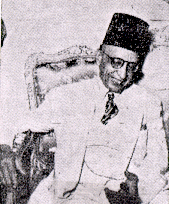
Ahmed Naguib el-Hilaly was an Egyptian lawyer and educator who served as Prime Minister of Egypt twice in 1952.
The trials and judicial hearings following the 2011 Egyptian Revolution were a series of legal moves to establish accountability among the various Egyptian government officials and prominent businessmen.
Saad El-Katatni is an Egyptian Islamist politician who has been the chairman of the Freedom and Justice Party (FJP) since October 2012. From January 2012 until its dissolution in September he was the first Speaker of the People's Assembly after the Egyptian Revolution of 2011. Prior to this, he served as the first secretary-general of the FJP and was a member of the Guidance Bureau of the Muslim Brotherhood.

George Ishak is an Egyptian politician and activist. During the later part of Hosni Mubarak's presidency, he co-founded the grassroots Kefaya opposition movement.
Allah maana is an Egyptian film released in 1955. Premiering on November 14 of that year, it was directed by Ahmed Badrakhan with a screenplay co-written by him and Ihsan Abdel Quddous and an all-star cast including Faten Hamama, Emad Hamdy, Magda al-Sabahi, and Mahmoud el-Meliguy. The film was censored to the point of almost preventing release, according to film critic and historian Aly Abou Shadi, over the portrayal of 1952 coup leader Mohammed Naguib. It was saved by Gamal Abdel Nasser’s approval, underlined by his attending the premiere at the Rivoli Cinema.
First cabinet of Maher Pasha was one of the governments of the Kingdom of Egypt. It was the last cabinet in the reign of King Fuad and the first one in the reign of King Farouk. It was headed by Aly Maher Pasha and existed between 31 January and May 1936. It replaced the government headed by Mohamed Tawfik Naseem Pasha which resigned on 22 January 1936. The cabinet was formed following the agreement of the political parties and was a caretaker government.